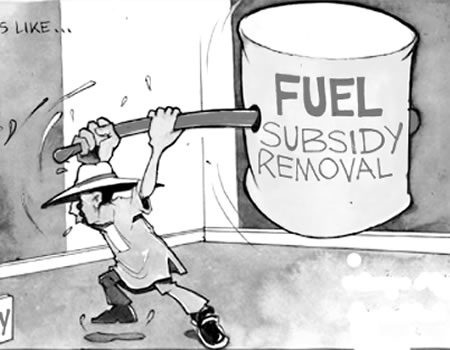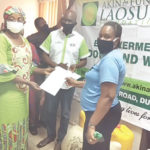SINCE political considerations displaced economic rationality in the pricing of petroleum products in Nigeria’s capitalist economy, the frequency of fuel price hikes has been astronomical. The problem started with the policy of uniform prices for petroleum products which necessitated the creation of a Petroleum Equalisation Fund to reimburse petroleum marketing companies for losses suffered from selling fuel at the same price in every part of Nigeria. The policy disregards market forces and ignores the fact that transportation is an essential part of production. It has been a major source of the chaos in the downstream sector of Nigeria’s petroleum industry. As of September 1978, the pump price of petrol was a little less than nine kobo per litre. The same product sold for N145.00 until last month – March 2020 – when the price was reduced by N20.00. The sharp difference resulted from constant increases effected by fiat under successive administrations in the name of subsidy removal. The rapid and ruinous fuel price hikes have been responsible for the high rate of inflation with the corollary of reduced value of money, plummeting purchasing power and lower quality of life.
While featuring on a television programme in Lagos recently, the Group Managing Director of the Nigerian National Petroleum Corporation (NNPC), Mr. Mele Kyari, made the proclamation that the era of fuel subsidy was gone forever. He repeatedly made the point that the government would no longer supplement the cost of fuel by whatever name it might be called – subsidy or under-recovery. He re-echoed ad nauseam, what Nigerians had been told times without number. He repeated the old story that the decision was in the interest of ordinary Nigerians because the policy would free funds for critical infrastructure in education, transportation, health and other sectors at different levels of government. He maintained that only the elite, who owned sports utility vehicles ‘’with four, five cars in their garages’’ had been benefiting from fuel subsidy. The NNPC boss told his viewers that subsidy removal would put an end to smuggling and arbitrage and went further to paint a rosy picture of Nigeria’s economy which stoppage of subsidy would bring about by attracting investments to the country.
Even to a casual observer, Kyari’s statement could not but arouse a feeling of déjà vu. One serious misfortune Nigeria has been contending with is that those thrown up by circumstances to manage its affairs have been compounding instead of solving its problems. At no time have they been imaginative enough to advance convincing arguments to justify the burdensome fuel price increases they have been foisting on the people, particularly the low-income group. When it is not patent illogicality, it is glaring falsehood. Is it the elite that operate commercial vehicles, motorcycles and tricycles? Is it the elite’s sports utility vehicles that convey farm produce from the rural areas to the urban centres? Are the intra-city, inter-city and inter-state commercial vehicles owned and operated by these same elite? Do these vehicles run on body fluid, water or on petrol? For how long will issues that fundamentally affect the well-being of the citizenry continue to be predicated on distortions of reality?
In other climes, subsidy provides support for enterprises in the different sectors of the economy and positively impacts on the citizens’ quality of life. In Nigeria, subsidy, like crude oil itself, has been more of a curse than a blessing. Fuel subsidy removal – the euphemism for unending price hikes – has always been a source of anguish particularly to the underprivileged. The most notable feature of former President Olusegun Obasanjo’s eight-year rule was the constant increases in fuel price. The product which was selling for N20.00 at the time he assumed office had had its price raised to N70 at the time he took his exit. The Goodluck Jonathan administration said it had put an end to subsidy payment when it raised the price of petrol from N65.00 to N141.00 per litre. The widespread protests ignited by the increase compelled it to review its stand and bring down the price to N97.00. When the government of President Muhammadu Buhari hiked the price to N145.00, Nigerians were told that subsidy payment was nothing but a scam and had been finally laid to rest.
As the chief executive of the agency that manages Nigeria’s lifeblood, Mele Kyari has obviously stated the position of the government. Each subsidy removal has been accompanied by promises to make a utopia out of the existing dystopia but the reverse has always been the case. Dilapidated roads, decrepit health facilities, deteriorating educational institutions and other indices of underdevelopment have remained the prominent features of life while the subsidy has remained unremovable. The subsidy on kerosene and diesel has for long been withdrawn. What is there to show for it? The promises to work wonders with savings from decades of subsidy removal are yet to be fulfilled. The problem is certainly not in the subsidy but in the managers of the economy.
It should not be difficult to decipher the objective of the subsidy removal announced by Kyari. The services of a soothsayer should not be required to discern that whenever there is a rebound in the global crude oil market and the price of the commodity rises to $60 and above a barrel, there will be a disproportionate upward adjustment of petrol price that will make life more difficult for the fast-disappearing middle class and more miserable for the underclass. The ranks of the have-nots will be further swelled in a country already adjudged as the world’s poverty capital.
- Olatoye writes in via Oladejoolatoye@gmail.com
YOU SHOULD NOT MISS THESE HEADLINES FROM NIGERIAN TRIBUNE
Buy and read digital replicas of your TRIBUNE titles by subscribing through E-VENDING
PHOTO NEWS: Suspected Coronavirus Patients Protest Treatment At Isolation Centre, Vow Never To Go Back
The patients, who trooped out from the Kwadon isolation centre, a few kilometres from Gombe town, alleged that they are starving at the centre, adding that they are not being well taken care of by the government. They marched on the highway disrupting free flow of traffic, showing their anger over what they described as… Read full story
COVID-19: Sick Emir Of Daura In Intensive Care
The Emir of Daura in Katsina State, Alh Umar Farouk, is currently at the Intensive Care Unit (ICU) of the Federal Medical Centre, Katsina due to his poor health condition. A source had told Tribune Online that contrary to a report emanating from one of the online media that the monarch was admitted since on Monday… Read full story
FG Bars CBN, PTF From Unbudgeted Spending COVID-19 Donations
The Federal Government on Tuesday issued guidelines on the management of all COVID-19 special funds and donations. In a statement issued by Office of the Accountant General of the Federation, all funds related to COVID-19 must pass through the Treasury Single Account (TSA) and must not be spent unless the National… Read full story
One Doctor Died, 32 Tested Positive After Contact With COVID-19 Patients, Says Kano NMA Chairman
Chairman of the Nigeria Medical Association (NMA), Kano State chapter, Dr. Sunusi Muhammad Bala, on Tuesday disclosed that its association had lost one doctor to the coronavirus pandemic while 32 others have tested positive in the state. He also said that its members had resolved that they would not risk their… Read full story
Yar’Adua Reversed Policies That Hurt Nigerians When He Was President, Says Buhari
President Muhammadu Buhari has described former President Umaru Yar’Adua as a patriot despite their political differences. A statement issued by Garba Shehu, Senior Special Assistant to the President (Media & Publicity), in Abuja on Tuesday said as Nigerians observed the 10th anniversary of the death of the former… Read full story
Senate Wants Police Force Decentralised
The Senate has called for the decentralisation of the Nigeria Police Force and the need for community policing as a way of addressing the country’s problem of insecurity. This formed part of the recommendations of the Senate Ad-hoc Committee on Nigeria Security Challenges which was considered and approved during… Read full story
All Set For Return Of 265 Nigerians From UAE On Wednesday ― Minister
The Minister of Foreign Affairs, Godfrey Onyema on Tuesday disclosed that the first batch of returning Nigerians in Diaspora would arrive in Nigeria on Wednesday, May 6, 2020… Read full story
Lagos Discharges Another 60 Patients After Testing Negative For Coronavirus
The Lagos State governor, Babajide Sanwo-Olu, on Tuesday, announced the discharge of 60 patients from isolation centres after they tested negative for coronavirus twice. According to the governor, 40 males and 20 females were discharged from Yaba, Ibeju Lekki and Eti Osa isolation centres to reunite with… Read full story
Oyo Border Areas Porous, Extend COVID-19 Testing To Oke-Ogun, Ogbomoso ― State Assembly Tells Makinde
The Oyo State House of Assembly has asked the Governor Seyi Makinde led government to pay attention to the porous nature of the state’s borders and extend testing to those border areas. The Assembly said this call became expedient due to the continued entry of foreign nationals into the state via borders in… Read full story
179 Arrested In Lagos For Flouting Face Mask, Distancing Order, 200 Vehicles Impounded
One hundred and seventy nine suspected violators of the face mask and social distancing order have been arrested by the police in Lagos State. Over 200 vehicles were also between Monday and Tuesday impounded by the police and the Lagos State Traffic Management Agency (LASTMA)… Read full story
CIBN To FG: Diversify Economy From Over-Reliance On Crude Oil
The Chartered Institute of Bankers of Nigeria (CIBN) on Tuesday called on the Federal Government to diversify the economy and review its policy to stir the country away from import dependence and increase non-oil revenue. A past president of the institute and keynote speaker, Mr Laoye Jaiyeola, made the call at an… Read full story
COVID-19: Nasarawa Govt Begins Tracing Of 74 People Who Had Contact With Late Lawmaker
Nasarawa State Government says its response team is tracing 74 contacts of the House of Assembly member who died due to the COVID-19 pandemic. Governor Abdullahi Sule made the disclosure while speaking at the beginning of an extended security meeting on Tuesday in Lafia… Read full story
WATCH TOP VIDEOS FROM NIGERIAN TRIBUNE TV
- Let’s Talk About SELF-AWARENESS
- Is Your Confidence Mistaken for Pride? Let’s talk about it
- Is Etiquette About Perfection…Or Just Not Being Rude?
- Top Psychologist Reveal 3 Signs You’re Struggling With Imposter Syndrome
- Do You Pick Up Work-Related Calls at Midnight or Never? Let’s Talk About Boundaries







